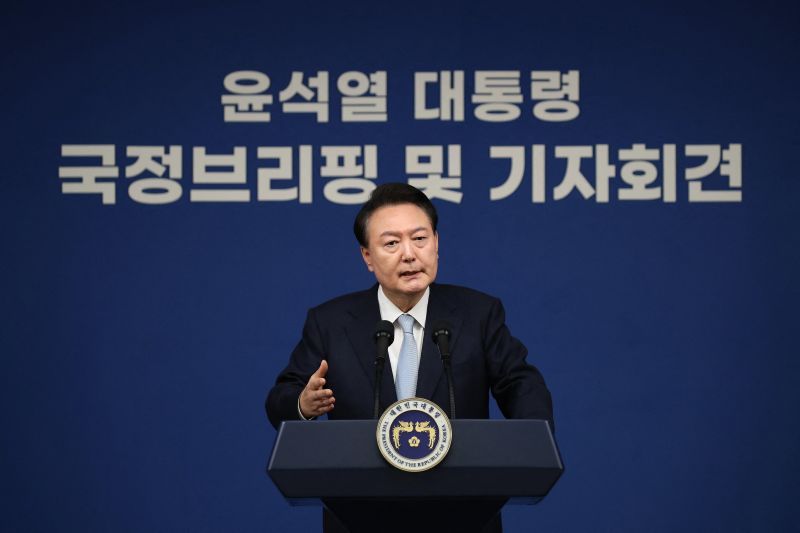- Home
- Middle East
- South Korea: Arrest Warrant Issued for President Yoon Suk Yeol

South Korea's President Yoon Suk Yeol speaks during a press conference at the presidential office in Seoul on August 29, 2024 ©Chung Sung-Jun / AFP
A South Korean court issued an arrest warrant on Tuesday for ousted President Yoon Suk Yeol to compel him to appear before investigators seeking to question him over his failed attempt to impose martial law.
"The arrest warrant and search warrant against President Yoon Suk Yeol (...) were issued this morning," the High-Ranking Officials Corruption Investigation Bureau, which oversees such cases, said in a statement. "No timetable has been set for the next steps," it added.
"The arrest warrant and the search and seizure warrant issued at the request of an agency that lacks investigative authority are illegal and invalid," Yoon Kab-keun, Mr. Yoon's lawyer, said in a statement sent to AFP.
This is the first time in South Korean history that a sitting president has been targeted by an arrest warrant, as Yoon Suk Yeol remains officially in office pending a Constitutional Court ruling on his impeachment, passed by the National Assembly on December 14.
He is currently suspended from his duties, with the court expected to confirm or overturn his impeachment by mid-June.
Mr. Yoon shocked the nation on December 3 by suddenly declaring martial law and deploying the military to the National Assembly to suppress it. He was forced to back down before dawn the next day under pressure from lawmakers and thousands of protesters.
He is under investigation for multiple charges, including "rebellion," a crime theoretically punishable by death, and is barred from leaving the country.
The 64-year-old former star prosecutor has ignored three summonses to be questioned over his attempted power grab.
A senior official from the High-Ranking Officials Corruption Investigation Bureau cited Mr. Yoon's repeated refusals to justify the warrant request. "The warrant is valid until January 6 (Monday morning)," the official said at a press conference, noting that the ousted president could be taken to a police station or Seoul Detention Center.
"Smooth Process"
While an arrest warrant has been issued, it is unclear whether authorities can effectively detain Yoon Suk Yeol, as his security detail has already blocked three previous searches, despite valid warrants.
"But they will likely coordinate with the investigative team in advance to execute the warrant," lawyer Yun Bok-nam told AFP, predicting a "smooth process."
The presidential guard, for its part, stated that it would act "in compliance with legal procedures," according to a statement shared with local media.
By early afternoon, hundreds of people had gathered outside Mr. Yoon's residence in central Seoul, mostly supporters chanting, "Martial law, legal; impeachment, invalid," and waving South Korean and U.S. flags.
Police were also present, an AFP photographer observed, urging protesters to keep their distance to avoid clashes.
Technically, anyone resisting the execution of an arrest warrant can be apprehended.
By Cat Barton, AFP
Read more



Comments